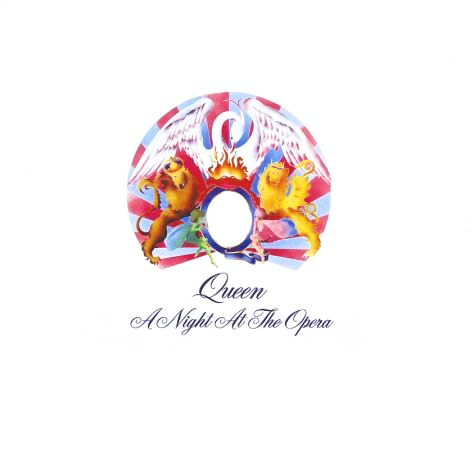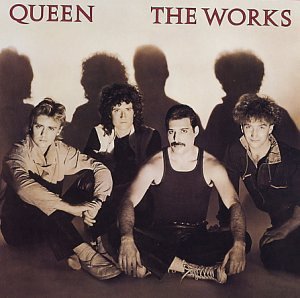03-XX-1976 – Phonograph Record
Queen: The New British Invasion
by Mitchell Cohen
“YOU’RE NOT going to ask me to interpret ‘Bohemian Rhapsody’, are you?”
“Not if you don’t want me to.” Freddie Mercury, drinking a Bloody Mary at – appropiately enough – the Olde London Pub and Grille has just been told about a fanciful yarn some F.M. jock has spun concerning Queen’s hit single. Something to do with a murder, a hanging and Ken Russell-ish mental fantasies leading to a resigned acceptance of death.
“I think that’s very rewarding, to be honest. It’s nice to hear somebody has gone that far to try and interpret a song. I like them to make up their own. If I were to come up with my interpretation, put my views to it, it would just shatter their illusions and things, so…They’ve got a competition on the radio back home; people had to write in what they thought the song was about. Hundreds and hundreds of letters came in. Some were really amazing.”
So, while ‘Bohemian Rhapsody’ may be this season’s ‘American Pie’ parlor game, it is also, thankfully, a totally brilliant single, easily the best thing Queen has done to date. It’s got everything: superb vocals, a flashy guitar solo, an absurd operatic middle section, and an interesting-enough structure and theme to hold the listener’s attention throughout its six-minute length. In England, it’s the biggest 45 in a decade, selling over 1.5 million copies, and the album from which it came, A Night At The Opera, is similarly topping the LP charts. At the moment, Britannia is ruled by more than one Queen. In their home country, as Mercury put it, they can do no wrong.
And unlike so many recent U.K. phenoms, Queen’s success appears to be making a smooth Atlantic crossing. The group is on a two-month American tour, going clean in most cities, as their album and single are steadily heading toward the top ten. These aren’t the first favorable U.S. indicators for the group – last year’s ‘Killer Queen’ and Sheer Heart Attack were very well-received – but this visit and these recordings do look to have a special significance for them. The influential press – Time, The New York Times – is on their heels, the SRO crowds are ecstatic, and Don Law, the kingpin of Massachusetts rock who promoted the concert at the Music Hall the night before the interview, was quoted in Boston magazine as calling Queen “the biggest act since the Beatles, absolutely the biggest since Led Zeppelin.”
Taking for granted the usual amount of promoter hyperbole, that is still a pretty strong statement to make. But stardom does seem to be in the air for Queen, and Freddie Mercury, at least, is casual in his acceptance of it. After seeing Queen’s show, a very theatrical and dramatic affair during which the flamboyant lead singer sometimes skirts on the hem of Rocky Horror exaggeration, one might expect a somewhat bizarre luncheon companion. But despite the makeup, slave bracelets and black nailpolish that give him a vampish, Theda Bara appearance (maybe their name comes from Cleopatra, Queen of the Nile), Mercury comes across as a lucid, unassuming fellow (John Deacon, the quintessential bass player, speaks barely a sentence in an hour and a half). Asked why Queen has broken through while other British bands have not, he answers easily.
“A very different kind of group, that. What you say is true only in one sense, because if you point out groups like T. Rex and Slade, that’s just one aspect of music that was going back home. Though I couldn’t put my finger on the reason, I didn’t think America would go for groups like that. I think they fall into a category that America wouldn’t accept.
“We just want to make sure that we appeal to as wide a cross-section as possible, and not cater to just a fragment of people. It’s limitless; we want to hit everyone. We’ve become sophisticated and disciplined and more listenable as a band, and I think we’ve matured and so has the audience. But I don’t think we’ve lost the hard-core fans, the real rock and rollers who bought the first album and know what Queen is really about. It’s just that we have a lot of sophisticated fans turning up.”
The previous evening at the Music Hall did seem to attract a well mixed assortment of the committed and the curious. Instead of a house packed wall to wall with rowdy young men of the sort that bopped a photographer acquaintance of mine with a beer bottle at a recent Black Sabbath concert, the Queen crowd was demographically less confined, reflecting the spectrum that the group has been able to span. By and large, popular bands get to be that way by one of three routes: getting hit singles via A.M. radio, relentlessly hitting the road (there are some very big groups who get no airplay of any sort), or cracking the F.M. album market. Queen is a rare example of a band that has done all three, at the same time overcoming backlash against trendy English bands and groups that sell singles. For a group with no built-in musical or personal association with the 1960’s, that’s quite an accomplishment. They’ve had to start from square one with no natural constituency.
On stage, Mercury is definitely the focal, as well as vocal point, but not to the exclusion of the three other members. In fact, in contrast to most hard rock bands that have an overpowering singer raving in front of a thick, monotonous background, Queen relies a great deal on multi-layered harmonies and complicated song structure that frees their stage act from the Tyranny of the Chord. Even without the various special effects like flares and smoke bombs that, much to the group’s disappointment, had to be scratched from the Music Hall show due to Massachusetts fire laws, Queen’s concert, with a few boring lapses (obligatory guitar and drum showcases for Brian May and Roger Taylor), was surprisingly entertaining. The stance of the group, a kind of arrogant defeatism and off-hand nihilism (“Nothing really matters”) that can tend to get overly serious, is extremely accessible to a young audience relating to Queen’s mixture of defiance and pessimism, and older fans respond to the complex textures of the music without being sucked into the vision. It may be a precarious political balancing act – incorporating elements of punk, pop, glitter, progressive and heavy metal without being tied to any one form – but for now both factions are kept more or less happy.
“Within the scope of the stage show there’s a bit of spontaneity to enhance the music we play, but there are certain set pieces that have to be done a definite way for them to leap out. Queen isn’t the kind of group that can go into a twelve-bar jam. We could do it, but it doesn’t work with the kind of show we do, which is really structured and holds together.”
The final result, on stage or on record, usually comes about after a fair amount of hassling, according to Mercury. “If there was ever an equally divided quartet, this is it. We need that kind of blend where each one’s got to contribute just about evenly. Just because I’m out front doesn’t necessarily mean I’m any kind of leader. We all have strong characters and we row constantly. It’s healthy, because then you get the cream, the good product. We’re very fussy, very meticulous, and have numerous battles to get the right sound.
“Deciding the single wasn’t an easy task, especially with the four of us having very strong views of how it should be released, cut or whatever. Back home our company couldn’t believe we wanted to release a six-minute single. We said, you’ll release it or else, figuring it was out of the ordinary, has a lot to say, and if it did click it would really put us on the map. So they did, and they’re jumping up and down now. It was a very big risk. It’s important to us to put across something that we feel is what Queen’s doing at the time, and we felt that ‘Bohemian Rhapsody’ probably captured more or less all the types of moods that we were doing at this given moment, so we thought, O.K., this is what we want to present to the public and let’s see what they do with it.”
Queen has arrived at their present status in a very organized, methodical manner. The group was formed at the early part of the decade, after all four members had completed college (Freddie studied Art, the others had Science backgrounds). May and Taylor had been in a group called Smile, and after the breakup of that group, they recruited Mercury and Deacon. Choosing Queen as their trademark (“It’s a very strong name, very universal”), they set about to see if the new quartet could cut it. After about eighteen months they knew they had a promising band. Their debut album, Queen, was released in 1973, and was rather better received in the U.S. than in Britain, but caused no great stir on either continent. Touring and a second LP, Queen II, increased their popularity, and Sheer Heart Attack really established them as major artists. Having been burned in the past by unscrupulous management, the members of Queen now take a lot of care and interest in all phases of their career from stage lighting to chart progress to album production, and devote their energies entirely to the business task at hand. They are, if anything, overly cautious and guarded. “Everything we undertake is such a mammoth project we can’t concentrate on anything else. It’s got to be that way whether it’s a tour or an album. Nothing else matters.”
As excellent as ‘Bohemian Rhapsody’ is – which means right up there in the league with ‘All The Young Dudes’ and ‘I’m Not In Love’ – there is some doubt about where Queen can go from here creatively. Certainly they do what they do with consumate professionalism and not a small sense of vocal and instrumental dynamics, but the material on all four of their albums is wildly uneven, with terriific tracks, ‘Liar’, ‘Killer Queen’, ‘Rhapsody’, alternating with unimaginative plodding rock. Right now Mercury’s voice, often reminiscent of Eric Carmen, strangely enough, as much as Robert Plant, is the best asset they’ve got, but his queenly stage demeanor may prove a limiting persona. At their worst, Queen succumbs to an almost morbid anguish, a victimized, “you’re tearing me apart” pretension that Peter Watkins and Paul Jones presaged so eerily in Privilege. They can also, on songs like the aforementioned ‘Killer Queen’ and ‘Flick of the Wrist’, be bright, inventive and rocking. Depending on whether they let their smarter or dumber fans, or instincts, guide them, they could end up either at the top of the hard-rock pile or in the midst of the art-rock heap.
“We don’t consciously think about what’s going to happen in a year’s time. We’re not that kind of group. Things just happen day to day and everything we do is at that very moment. I don’t even know what kind of shape the next album’s going to take. Let it take its course. Right now, it’s looking very rosy.”



